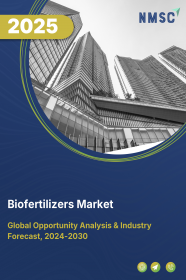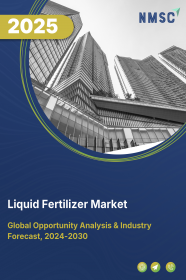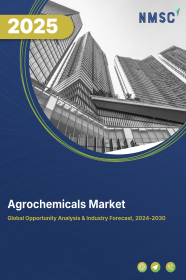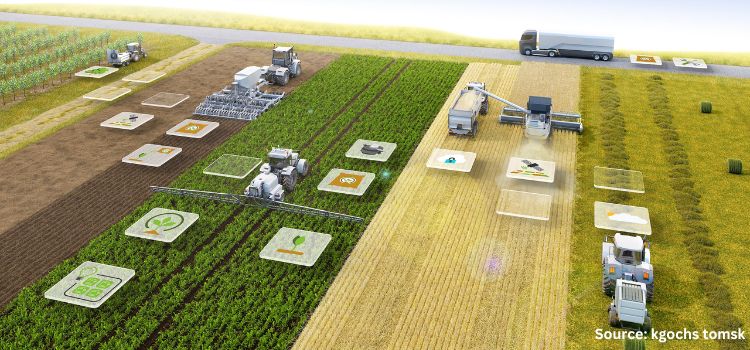
Biofertilizers Market by Type (Nitrogen-fixing, Phosphate Solubilizing, Potassium Mobilizing, and Others), by Microorganism (Rhizobium, Azotobacter, Azospirillium, Pseudomonas, Bacillus VAM and Others), by Crop Type (Cash Crops, Horticulture Crops, and Row Crops), and by Mode of Application (Soil Treatment, Seed Treatments, Foliar Sprays, and Other Application Methods) - Global Opportunity Analysis and Industry Forecast 2025–2030
Biofertilizers Market Overview
The global Biofertilizers Market size was valued at USD 2.36 billion in 2024 and is predicted to reach USD 4.58 billion by 2030 with a CAGR of 11.7% from 2025-2030.
Sustainable farming, floriculture and horticulture advancements, and advances in technology are factors propelling market growth. However, expensive production cost, confines their extensive adoption by farmers with a low budget. Furthermore, the leaders, namely, National Fertilizers Limited, Novozymes, Andermatt Biocontrol Inc and others are implementing a variety of measures including product launches to raise product efficacy, enlargement of their global distribution networks, and utilization of sustainable manufacturing practices. On the contrary, the precision agriculture technology creates future opportunity in the market. Being highly optimized at both crop yields and environmental effect minimizes them through synergy into highly effective applications.
The Increasing Demand of Sustainable Agriculture Drives the Market Growth
The increasing focus on sustainable agriculture drives the industry of biofertilizers by creating a gradual movement toward eco-friendly and resource-effective agriculture. The Research Institute of Organic Agriculture reported that there are now organic farming activities happening in 188 countries as of June 2024, over 96 million hectares of farmland is being managed by at least 4.5 million farmers to meet the environmentally sustainable demands and organic sales of organic food and beverages during 2022 reached 140.2 billion, thereby accelerating the growth of organic fertilizer industry.
The Rising Demand of Horticulture and Floriculture Drives the Market Trends
The global horticulture and floriculture also led to the rise of the biofertilizer market, as in both sector quality sustainable inputs are required for an increased crop yield and quality. Flora Culture International reported that exports of ornamental plants worldwide are on the growth trend with 3.9% annual growth in the past five years. With the ever-increasing demand for premium produce and ornamental plants, the mandatory use of biofertilizers allows for the enhancement of good performance with environmental sustainability.
The Demand for Organic Farming Solutions Drives the Demand of the Market
Growing organic farming and chemical-free demand is expected to continue driving biofertilizer adoption. Farmers are equally looking for sustainable solutions in healthy soil conditions and optimizing crop productivity. For example, in July 2024, EnviroKure launched its PhylloZone solution, a groundbreaking biofertilizer that enhances crop profile, delivers high yield and reduces sustainability. This reflects an increasing tendency in the growing alternatives of eco-friendlier solutions for farm input in the biofertilizer market. This supports the expanding trend of more ecological farming solution alternatives in the market for biofertilizer.
High Cost Hinders the Market Growth
Higher production costs for biofertilizers are a major restraint in its widespread use among farmers with a lower budget.
The Precision Agriculture Technology Creates Future Opportunity in the Market
The precision of agriculture technology presents significant future opportunities in the biofertilizer market. By optimizing crop yields that minimizes environmental impact, these technologies enhance efficiency through targeted applications. Increases in the use of precision farming tools to drive the demand for biofertilizers positions them as one of the main components of contemporary sustainable agricultural systems.
Market Segmentation and Scope of The Study
Biofertilizers market report is divided on the basis of type, microorganism, crop type, mode of application, and region. On the basis of type, the market is divided into nitrogen-fixing, phosphate solubilizing, potassium mobilizing, and others. On the basis of microorganism, the market is divided into rhizobium, azotobacter, azospirillium, pseudomonas, bacillus VAM and others. On the basis of crop type, the market is divided into cash crops, horticulture crops, and row crops. On the basis of mode of application, the market is divided into soil treatment, seed treatments, foliar sprays, and other application methods. Regional breakdown and analysis of each of the aforesaid segments includes regions comprising of North America, Europe, Asia-Pacific, and RoW.
Geographical Analysis
North America, currently dominates the biofertilizers market share due to progressive agricultural practices and concern for sustainability. The focus in North America on reducing the use of chemicals including fertilizers is highly conducive to biofertilizer adoption.
In a report by McKinsey, more than 68 percent of farmers adopted reduced or no-till practices, almost half are using variable-rate fertilizer application, and 35 percent have adopted controlled-irrigation methods. These sustainable strategies improve resource use efficiency and conservation of the environment, thereby establishing positive utilization of biofertilizers as part of eco-friendly agricultural systems.
Moreover, the increased fertilizer demand in the region marked a shift toward sustainable inputs, and biofertilizers rose as an environmentally friendly alternative approach to improve crop yields and achieve environmental objectives. According to Statistics Canada, the sales of fertilizers in the country were up 29.1% during the first half of this year and grew over USD 1.36 billion in May compared to the same month last year. As organic fertilizer is gaining popularity as a sustainable substitute, the fertilizers industry is also been growing, that is fuelling the demand of organic fertilizers.
On the other-hand, Asia-Pacific is growing steadily in the market due to innovative products of biofertilizers that entered into the market and further boosted the growth of the market by increasing crop productivity and providing support for agricultural farming. For instance, the Indian company, KRIBHCO, introduced a new variant of a biofertilizer, KRIBHCO Rhizosuper, to improve soil fertility and increase crop productivity by providing the necessary nutrients to the plants. This launch fits within the fast-increasing trend for sustainable solutions in farming.
Additionally, adoption of biofertilizers is being driven by reduction in the usage of chemical fertilizer and an increase in fertility of the soil due to regional government policies, that are acting as catalysts to the growth of the market. As per food and agriculture organization, the government policies in China is promoting sustainable agriculture, that is propelling the adoption of biofertilizers. The government also launched initiatives such as zero growth in fertilizer use, that strives to cut back on affluence to chemical manufacturers and to include the greener foreign counterparts.
Competitive Landscape
Various players in the organic fertilizers sector includes, Novozymes, Symborg, Inc., Gujarat State Fertilizers and Chemicals, IPL Biologicals Limited, Lallemand Inc., Rizobacter, T. Stanes & Company Limited, Indian Farmers Fertilizers Cooperative Limited, National Fertilizers Limited, Agrilife, Mapleton Agri Biotech, Biostadt India Limited, Kiwa Bio-Tech, Koppert Biological Systems Inc., Andermatt Group AG, and others. These market players are opting strategies including product launches to maintain their dominance in the market.
For instance, in November 2024, National Fertilizers Limited rolled out nano urea, that is the technological advantage in fertilizer products, directly contributing to growth in the biofertilizer industry by making sustainable alternatives more popular.
Moreover, in November 2023, Novozymes launched Quara LowP, to enhance pre-treatment of renewable diesel and sustainable aviation fuel feedstocks. This technology facilitates the production of a broader array of feedstocks by effectively stripping contaminants such as phosphorus and metals, resulting in greater yields, lower operating costs and better sustainability.
Also, in October 2023, Andermatt Biocontrol launched Aprehend, a biopesticide based on Beauveria bassiana, thus broadening the horizon of biological products in agriculture and following the growing trend of bio-based solutions.
Key Benefits
-
The report provides quantitative analysis and estimations of the natural fertilizers market from 2025 to 2030, that assists in identifying the prevailing industry opportunities.
-
The study comprises a deep-dive analysis of the current and future biofertilizers market trends to depict prevalent investment pockets in the market.
-
Information related to key drivers, restraints, and opportunities and their impact on the biofertilizers trend is provided in the report.
-
Competitive analysis of the key players, along with their market share is provided in the report.
-
SWOT analysis and Porters Five Forces model is elaborated on the study.
-
Value chain analysis in the market study provides a clear picture of roles of stakeholders.
Biofertilizers Market Key Segments
By Type
-
Nitrogen-fixing
-
Phosphate Solubilizing
-
Potassium Mobilizing
-
Others
By Microorganism
-
Rhizobium
-
Azotobacter
-
Azospirillium
-
Pseudomonas
-
Bacillus VAM
-
Others
By Crop Type
-
Cash Crops
-
Horticulture Crops
-
Row Crops
By Mode of Application
-
Soil Treatment
-
Seed Treatments
-
Foliar Sprays
-
Other Application Methods
By Region
-
North America
-
The U.S.
-
Canada
-
Mexico
-
-
Europe
-
The UK
-
Germany
-
France
-
Italy
-
Spain
-
Denmark
-
Netherlands
-
Finland
-
Sweden
-
Norway
-
Russia
-
Rest of Europe
-
-
Asia-Pacific
-
China
-
Japan
-
India
-
South Korea
-
Australia
-
Indonesia
-
Singapore
-
Taiwan
-
Thailand
-
Rest of Asia-Pacific
-
-
RoW
-
Latin America
-
Middle East
-
Africa
-
Key Players
-
Novozymes
-
Symborg, Inc.
-
Gujarat State Fertilizers and Chemicals
-
IPL Biologicals Limited
-
Lallemand Inc.
-
Rizobacter
-
T. Stanes & Company Limited
-
Indian Farmers Fertilizers Cooperative Limited
-
National Fertilizers Limited
-
Agrilife
-
Mapleton Agri Biotech
-
Biostadt India Limited
-
Kiwa Bio-Tech
-
Koppert Biological Systems Inc.
-
Andermatt Group AG
REPORT SCOPE AND SEGMENTATION:
|
Parameters |
Details |
|
Market Size in 2024 |
USD 2.36 Billion |
|
Revenue Forecast in 2030 |
USD 4.58 Billion |
|
Growth Rate |
CAGR of 11.7% from 2025 to 2030 |
|
Analysis Period |
2024–2030 |
|
Base Year Considered |
2024 |
|
Forecast Period |
2025–2030 |
|
Market Size Estimation |
Billion (USD) |
|
Growth Factors |
|
|
Countries Covered |
28 |
|
Companies Profiled |
15 |
|
Market Share |
Available for 10 companies |
|
Customization Scope |
Free customization (equivalent to up to 80 working hours of analysts) after purchase. Addition or alteration to country, regional, and segment scope. |
|
Pricing and Purchase Options |
Avail customized purchase options to meet your exact research needs. |

















 Speak to Our Analyst
Speak to Our Analyst



















